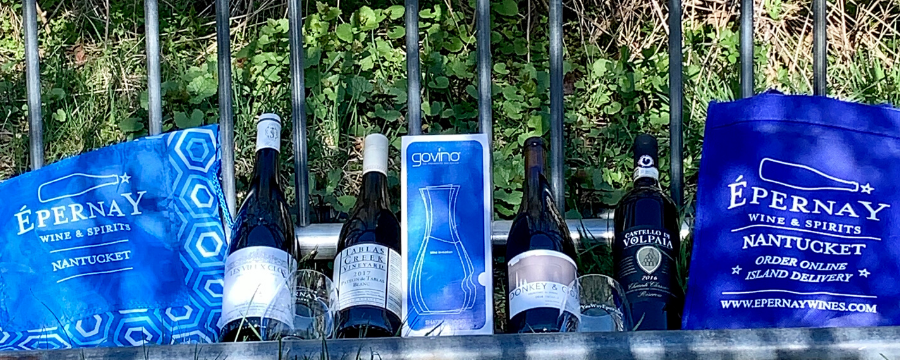
Earth Friendly Wines | Drink As Healthy As You Eat
April 16, 2020Movies are always a great distraction from our own reality, no matter what your present-day situation may be. There are numerous movies where if wine and life revolving around it is not the central theme of the plot, it is part of the script at some point in the film. Most often, the person drinking the wine is rich, famous, has a large yacht and an even bigger estate – typically both with a wine cellar!
Previously, you would have thought of this person as a wine SNOB. Living life to the extremes has taken a back seat to today’s current situation. Now there is a whole new meaning in regard to the word SNOB when it comes to wine drinking.
With Earth Day just around the corner and it is more important now more than ever to take care of ourselves, our community and the environment, let’s talk about what a wine SNOB is these days.
SUSTAINABLE
Do you ever want to drink a wine that you know does good for the Earth? Sustainable practices are abundant in wineries of all shapes and sizes across the globe these days. These can range from being committed to organic farming, reclaiming water for irrigation, and using solar power to supply the entire winery with energy. These practices aim to protect the environment by being socially responsible in their winemaking techniques, all while trying to stay in business and produce high quality wines.
This is important as these wineries as seeing themselves as stewards of the land. While they want to harvest and reap the benefits of growing and producing wine (including personal consumption), they also know that they must leave the vineyard better than when they found it in order for it to provide for future generations. How is that for some forethought? This type of thinking isn’t new, however, as some wine regions have been practicing this for centuries. It was just the way they did it back then, and still do today.
Volpaia, which translates to ‘fox’s lair’ in Italian, is the name of a small hamlet just north of the town of Radda in Chianti area of Tuscany. Within the walls of this fortified village of medieval origin (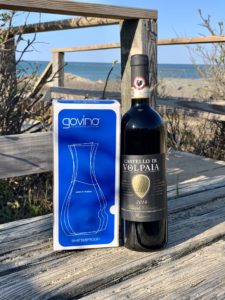 one of the best preserved of its time) is the winery Castello di Volpaia. Almost the entire village (of less than 100 people) in somehow linked with the winery. Here they produce only Vino Biologico (certified organic wines). A few of their sustainable practices include what cover crops they use, increasing biodiversity in the vineyards, and taking efforts to reduce their overall carbon footprint.
one of the best preserved of its time) is the winery Castello di Volpaia. Almost the entire village (of less than 100 people) in somehow linked with the winery. Here they produce only Vino Biologico (certified organic wines). A few of their sustainable practices include what cover crops they use, increasing biodiversity in the vineyards, and taking efforts to reduce their overall carbon footprint.
CASTELLO DI VOLPAIA CHIANTI CLASSICO RISERVA
This particular wine is made from 100% Sangiovese, a lighter style grape varietal most well-known from this region. It is a blend of the wines coming from the best vineyards of Volpaia. It is then aged for 24 months in a combination of Slovenian and French oak, then aged for at least another 3 months in the bottle before release. The wine is a beautiful ruby red with a trace of garnet around the edge. The nose is intense with hints of spice, dried orange peel and ripe red berries. Layers of earthiness abound on the palate, with moderate structure and evident tannins that linger on the tongue.
For optimal enjoyment, decant an hour before consumption in a GoVino Decanter… and pair with your favorite pizza!
NATURAL WINE:
Natural wine is just as the name implies, as nature intended. These wines tend to use the least amount of chemicals or additives as needed, are typically unfined or unfiltered (hence they may be a little cloudy, not a flaw here…), and as few as possible technical procedures are utilized to make the wine. For a wine to really be considered natural, the idea of such minimal intervention must be seen not just in the vineyard, but also in the winery all the way through until the wine is bottled.
Donkey & Goat Winery, located in an industrial area of Berkeley, California, is owned and operated by husband and wife team – Jared and Tracey Brandt. Their philosophy about ‘natural wine’ is that this term extends both to the vineyard and the cellar. This is what they feel distinguishes them from natural or sustainable farming practices that only occur in the vineyard.
Their wines are made from sustainably farmed vineyards and the grapes are hand-harvested. Nothing else is added (or removed) in the cellar except for a small amount of effective Sulphur as needed. This means no stabilization, fining or filtration. They also produce wines that have extended skin contact with the grapes, also known as an ‘orange’ wine since it will absorb some of the color of the grape itself. This is how they have been making wine since their inception, and will continue to do so, they are that passionate about what they do.
DONKEY + GOAT MOURVEDRE “TWINKLE” EL DORADO
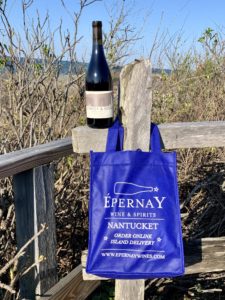 This wine is made from 100% Mourvedre, which is also known as Monastrell in Spain. While it is typically a full-bodied red wine, this quintessential chillable red is much lighter than the typical style of spicy character found in this grape varietal. It absolutely shows the expected rusticity of this grape, however. This is a must have poolside if you prefer red wines over whites. And if you happen to be sans pool, labeling this is a red wine lover’s ‘porch pounder’ will do.
This wine is made from 100% Mourvedre, which is also known as Monastrell in Spain. While it is typically a full-bodied red wine, this quintessential chillable red is much lighter than the typical style of spicy character found in this grape varietal. It absolutely shows the expected rusticity of this grape, however. This is a must have poolside if you prefer red wines over whites. And if you happen to be sans pool, labeling this is a red wine lover’s ‘porch pounder’ will do.
It has a lovely nose of crushed raspberry and strawberry, with a hint of dusty earthiness. It is light bodied, yet racy on the palate with a flavor profile that matches the nose with a hint of orange zest and pomegranate.
Easy to tote around in the Épernay Wine & Spirits Re-usable Wine Tote… featuring six interior floating sleeves that fold to the side when you need room for larger items other than wine, making this tote highly multi-functional!
ORGANIC
Seeing the term ‘organic’ on a wine label can be a little tricky and requires a little more insight. If the wine is USDA Organic, then it is made with organic grapes, any additives used to make the wine are organic, and no GMO’s are added. This also means that no sulfur is added, which is the best natural preservative for wine, and these wines must be consumed sooner than later. For this reason, this category of wine is more difficult to find as there are not as many available.
There is also the concept of ‘made with organic grapes’ or ‘made with organically grown grapes,’ which both have more readily available options. This refers only to the grapes before they come into the winery, not necessarily that the winemaking process was organic itself. Don’t stress here, though. If a winery has taken the steps to work with organic grapes, they are most likely following as close as they can to other organic or sustainable practices in the winery as well.
Tablas Creek Vineyard, located in Paso Robles, California, has certified organic and biodynamic (more on that soon) estate vineyards. They are largely dry-farmed, with limited yields of crops that emphasize the character of the place of which they are grown. This winery is known as the pioneer of California’s Rhône movement, in which they work mostly with grape varietals originally from this region in France.
TABLAS CREEK PATELIN DE TABLAS BLANC, PASO ROBLES
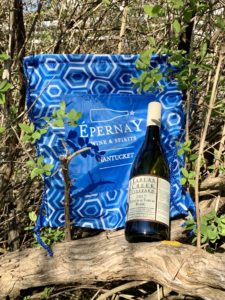 This wine is a blend of five white Rhône varietals: Grenache Blanc (not to be confused with Grenache the red grape), Viognier (a highly aromatic wine from the Northern Rhône), Roussanne, Marsanne and Clairette (all typically blended together to equal a greater sum of their parts). As an homage to the many white wines from Southern Rhône, this wine has crisp acid and rich mouthfeel on the palate from the Grenache Blanc, with added for floral and tropical aromatics from the Viognier, and small additions of Roussanne and Marsanne for structure.
This wine is a blend of five white Rhône varietals: Grenache Blanc (not to be confused with Grenache the red grape), Viognier (a highly aromatic wine from the Northern Rhône), Roussanne, Marsanne and Clairette (all typically blended together to equal a greater sum of their parts). As an homage to the many white wines from Southern Rhône, this wine has crisp acid and rich mouthfeel on the palate from the Grenache Blanc, with added for floral and tropical aromatics from the Viognier, and small additions of Roussanne and Marsanne for structure.
The nose is redolent of nectarines, pineapple and jasmine. The mouth is layered with passion fruit, peach, and minerality. The wine continues with mouth-watering acidity softening into a creamy richness on the finish. Bonus is this elegant wine is easy to get into with a screwtop closure.
Paired perfectly with an Épernay Wine & Spirits Insulate Sport Pak Cooler… draw strings make it easy to sling on your back, and it can easily hold a handful of bottles or a 6 pack of beer with some ice.
BIODYNAMIC
Biodynamic practices are a holistic approach to the agricultural health of the vineyard. This could include mobile herding of sheep, alpacas, or guard donkeys to help control weeds, fertilize, and aid in building healthy soils. This maintenance of soil health, along when you plant and harvest, is based on timing with lunar cycles. Different ‘teas’ and preparations are made of natural products and applied to the vineyard in certain cycles. These wines also include low intervention in winemaking as well in order to coincide with what occurs in the vineyard.
While Rudolph Steiner is known as the person who wrote the book on Biodynamic Agriculture in the previous century, Nicolas Joly is the modern-day godfather of this approach to winemaking. His vineyard and winery are located in the Loire Valley of France, where he makes three wines from three different appellations of the region.
NICOLAS JOLY SAVENNIÈRES ‘LES VIEUX CLOS’
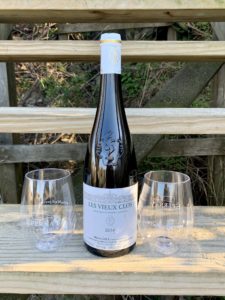 This wine is made from 100% Chenin Blanc. Chenin Blanc gets its complexity when it is fully ripe and has a deep yellow color. Healthy, sustainable farming helps to ensure that the grapes reach this optimal ripeness. These grapes are hand-picked when they are ready, meaning a vineyard worker may need to pick certain grapes at one time and come back several times to pick other grapes. The wine is made with little intervention and aged in used barrel for 6 – 8 months.
This wine is made from 100% Chenin Blanc. Chenin Blanc gets its complexity when it is fully ripe and has a deep yellow color. Healthy, sustainable farming helps to ensure that the grapes reach this optimal ripeness. These grapes are hand-picked when they are ready, meaning a vineyard worker may need to pick certain grapes at one time and come back several times to pick other grapes. The wine is made with little intervention and aged in used barrel for 6 – 8 months.
The wine welcomes you with aromas of Asian pear, nectarine and passion fruit, followed by a distinctive mineral component from the schist soil on which it is grown. It is complex and vibrant on the palate with a long finish. Due to the uniqueness of how this wine is grown and produced, it is important to note that the color is not due to oxidation (the wine being in contact with oxygen). If anything, the wine should improve over several days as it is allowed to breathe out of the bottle.
A Match with Épernay Wine & Spirits Go Vino stemless drinking vessels… reusable, recyclable, go anywhere glass!
Who wants to be part of the new version of a wine SNOB drinker? While this is just a sampling of SNOB (sustainable, natural, organic, biodynamic) wines that are worthy of your attention, these types of wines luckily come in all colors and a myriad of flavors!
Join us for our Thursday Virtual Wine Tastings (FB Live + IG Live, Thursdays @ 6 PM) to learn more about these types of wines and how they benefit not just you, but Mother Earth as well!
Comments